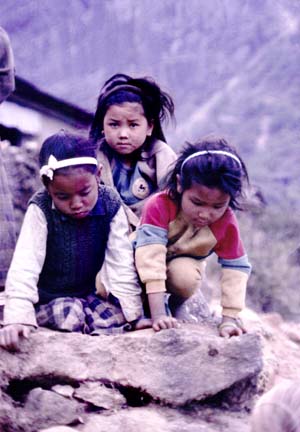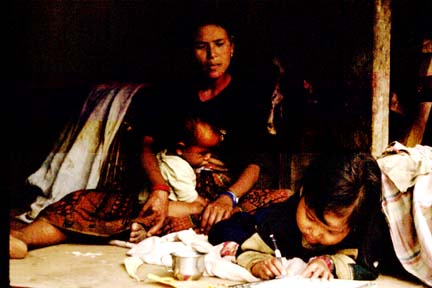|
Block 1– Fall 2001– 9:00 - 12:00
Barnes 403 (please note room change)
Office hours: Monday and Thursday: 1:00 – 2:30 and by appointment
Course Description: This course is an introduction to cultural
anthropology. The goals of the course are to examine the diversity
of human cultural forms in areas such as subsistence (making a
living), social and personal identity, emotions, ritual and belief,
social inequality, family and kinship, and gender. We will discuss
a variety of cultural groups, from Himalayan farmers to Bedouin
Arabs to high-school students in small-town Texas. In doing so,
we will attempt both to understand these groups and to become
more aware of the ways that our own cultural beliefs and understandings
are constructed. The course is designed both to teach about the
unfamiliar cultural practices and beliefs of others and to encourage
an examination of our own cultural actions and assumptions about
the world. We will pay particular attention to ethnography, the
unique methodology of anthropology, and will look at the experiences
and results of various kinds of ethnographic fieldwork. We will
also address issues such as social change, intercultural contact
and conflict, and social inequality.
Some recurring themes of course: fieldwork, ethnography, culture,
power, difference
Required Texts: All texts are available at the Colorado College
Bookstore. Additional readings, in the form of articles, will
be made available to you. Let me know immediately if you have
any problem obtaining the readings.
* Love and Honor in the Himalayas: Coming to Know Another Culture.
Ernestine McHugh. University of Pennsylvania Press.
* Learning Capitalist Culture: Deep in the Heart of Tejas. Douglas
E. Foley. University of Pennsylvania Press.
* Veiled Sentiments: Honor and Poetry in a Bedouin Society. Lila
Abu-Lughod. University of California Press.
COURSE REQUIREMENTS:
If you miss class for any reason, or are late, it is your responsibility
to find out any assignments, announcements, or missed materials
from a classmate.
Attendance is required; please inform me if you need to miss class
for any reason. The portion of the grade labeled "participation"
includes overall attendance, participation in class discussions,
contributions to a positive learning environment, and unscheduled
activities such as in-class writings, brief overnight research
or writing assignments, discussion exercises, film notes, or pop
quizzes. Readings should be done before class on the date they
appear on the syllabus. Please bring current reading materials
to class each day so that we can refer closely to the text when
appropriate. I expect you to come on time and with something thoughtful
to say about the reading.
You should be prepared each day to speak to the following questions:
What is the basic argument of each reading? How persuasive is
the argument? How effectively are the arguments supported? What
do you agree/disagree with in the readings, and why? What, if
any, points are there in the readings at which you simply don’t
understand what the author is saying? How does this material speak
to other material we have encountered in this class? What would
be an interesting point at which to begin discussing these readings?
I do not accept late work unless (1) you have made prior arrangements
with me based on a legitimate reason, such as serious illness
or family emergency OR (2) there is a genuinely unforseeable emergency.
All work for this class should be performed under the Honor Code
of Colorado College.
Although I have planned the syllabus very carefully, it is possible
that I may decide to make minor changes. I will notify you of
these in class and you will be responsible for them.
Grading breaks down as follows:
35% Participation
--short writing assignments (either in-class or overnight)
--participation in daily class discussions and activities
--attendance at lectures, discussions, and films
--film notes
--pop quizzes
--other unannounced class activities
15% Midterm Exam
35% Ethnographic Project
--proposal(s)
--fieldnotes
--field research
--final written paper
--final oral presentation of findings
15% Final Exam
**ADDITIONAL AFTERNOON VIDEOS MAY BE ADDED TO THE SCHEDULE. YOU
WILL BE INFORMED OF THESE IN CLASS AHEAD OF TIME**
|



